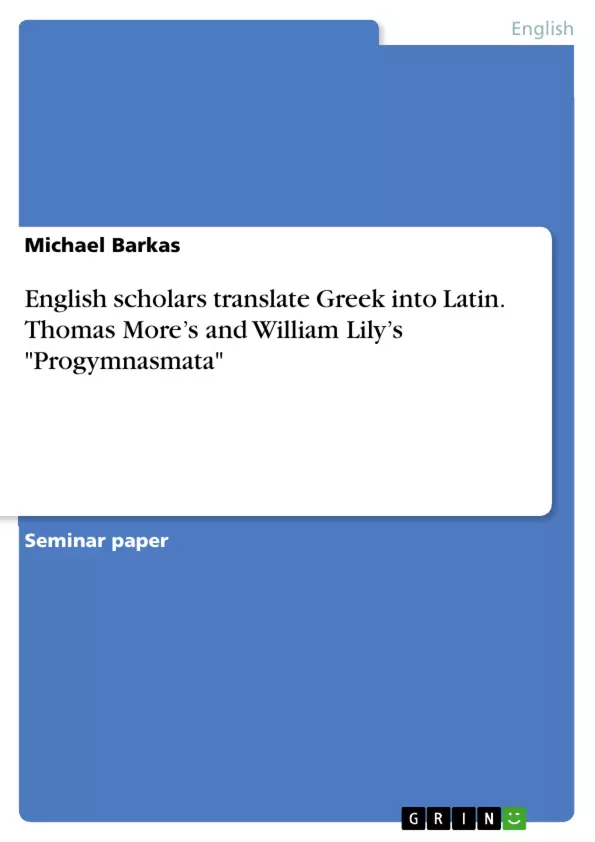The paper analyses five epigrams in Thomas More's and William Lily's work "Progymnasmata" and elaborates on the translation techniques used by the two scholars with reference to their adaptation from the Greek original, word choice, syntactic preferences, metrical qualities and other features.
Table of Contents
- INTRODUCTION.
- MORE'S AND LILY'S EDUCATIONAL BACKGROUND.
- PROGYMNASMATA AND METHODOLOGY.
- EPIGRAM ANALYSIS.
- A MOUSE IN THE HOUSE…..\n
- IMMODERATE LUXURIES.
- ZEUS' DISSIPATIONS..\n
- DISDAINING FORTUNE..\n
- A STATUE EPIGRAM.......
- CONCLUSION
Objectives and Key Themes
This paper analyzes the Latin translations of five epigrams from Thomas More's Progymnasmata, comparing them to the original Greek Anthology versions. The analysis aims to determine if the epigrams are understood similarly in both languages and to assess the fidelity of More's and William Lily's translations. It examines the effectiveness of their translations by considering various linguistic features such as word choice, poetic composition, rhetorical figures, syntax, and the overall message of the epigrams.
- Comparative analysis of Latin translations of Greek epigrams from More's Progymnasmata
- Understanding the epigrams in both Greek and Latin
- Assessing the fidelity of More's and Lily's translations
- Analyzing linguistic features in the translations
- Examining the impact of educational purposes on the translation process
Chapter Summaries
- The introduction sets the stage for the analysis by providing background information on Thomas More and William Lily, their educational backgrounds, and the significance of progymnasmata in Renaissance education. It also discusses the methodology employed for comparing the translations.
- The first chapter delves into the educational context of the progymnasmata, tracing their origins and explaining their role in the development of language skills, particularly in rhetoric and writing. It highlights the importance of imitation and the role of classical models in Renaissance humanism.
- The second chapter focuses on the biographies of Thomas More and William Lily, two prominent English humanists. It explores their individual paths in education, their connections to influential figures like John Colet and Erasmus, and their contributions to the revival of classical learning.
Keywords
This paper examines the translation of Greek epigrams into Latin by prominent English humanists, Thomas More and William Lily. It explores the educational context of progymnasmata, the role of classical models, and the methods used to translate and adapt epigrams. The paper focuses on linguistic analysis, comparing word choice, poetic composition, rhetorical figures, and overall message across languages. Additionally, it delves into the significance of classical learning and the influence of Renaissance humanism on education. This study examines the impact of different translation approaches on the understanding and interpretation of ancient texts, highlighting the challenges and nuances of rendering meaning across languages and cultures.
Frequently Asked Questions
What are "Progymnasmata"?
They are preliminary rhetorical exercises used in Renaissance education to develop language skills through imitation and classical models.
Which scholars are the focus of this paper?
The paper analyzes the collaborative and individual work of English humanists Thomas More and William Lily.
What translation techniques are examined?
The analysis looks at word choice, syntactic preferences, metrical qualities, and rhetorical figures in the adaptation from Greek to Latin.
What is the source material for the translations?
The scholars translated five epigrams from the original Greek Anthology versions into Latin.
How did Renaissance humanism influence these translations?
Humanism emphasized the revival of classical learning and the use of ancient texts to teach effective communication and moral philosophy.
- Citar trabajo
- Dipl. Archäologe / B. Ed. Englisch-Latein Michael Barkas (Autor), 2016, English scholars translate Greek into Latin. Thomas More’s and William Lily’s "Progymnasmata", Múnich, GRIN Verlag, https://www.grin.com/document/346838



